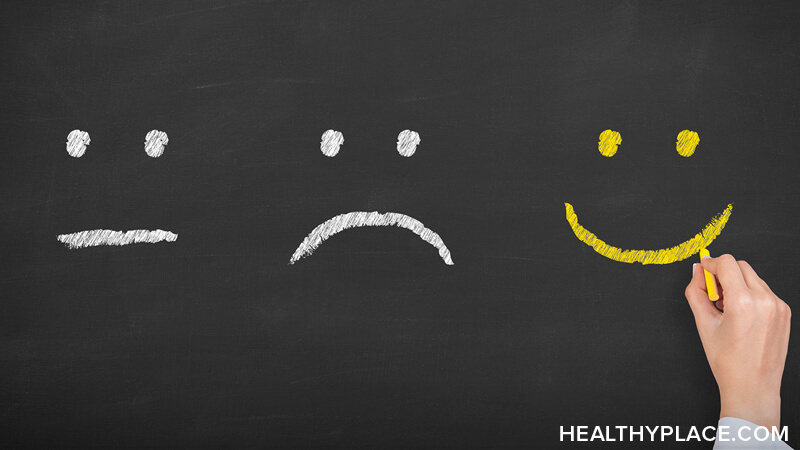What Does It Mean to Be Emotionally Healthy?

To be emotionally healthy is to actively and intentionally create a positive, balanced experience in your life as well as within yourself. Being emotionally healthy does not mean always feeling happy, and it does not mean never having bad things happen. Being emotionally healthy also doesn’t mean ignoring negative situations and feelings; instead, emotional wellness is to be aware of all of your emotions, accept the good and the bad, and maintain a positive outlook despite life’s ups and downs and twists and turns.
To best conceptualize an emotionally healthy definition, it’s helpful to envision what positive emotional health and poor emotional health are like for people.
Imagine a person named Sam. Sam can be male or female or gender neutral and be any age (for consistency, we’ll use “he.”) Sam’s romantic relationship of nearly 10 years just ended. He also was recently informed by his boss that to keep his job, he must transfer to a different location across the country. Sam doesn’t want to move, but the job prospects in his area are slim.
In part, Sam’s reaction to this adversity will impact his emotional health. However, his emotional health will play a part in how he responds to these challenges. Let’s take a look at an emotionally health Sam and a Sam with poor emotional health.
Characteristics of Emotionally Healthy People
Emotionally healthy people possess certain characteristics or traits that help them keep moving forward despite even the biggest bumps in the road of life. Because Sam is emotionally healthy, he will likely
- Feel sad, maybe devastated, about the end of his intimate relationship and let himself feel bad
- Feel angry or anxious about his job situation, acknowledge those feelings, and know they’re appropriate for the situation
Emotionally healthy people let themselves experience feelings because they know that to be human means to have a wide range of emotions. They don’t wallow in their feelings or let their feelings determine what they do or don’t do. Sam lets himself have emotions, but he does not let those emotions have control over him.
Emotionally healthy people accept their emotions rather than denying or fighting them. If the feelings come from making a mistake, they accept that, learn from it, and move on.
People with a high degree of emotional health engage in emotional wellness activities and choose to:
- Remain optimistic even during setbacks
- Focus on what is right rather than what is wrong
- Seek realistic things for which to be grateful
- Develop goals and plans so they can stay on track when things try to derail them (Sam knows his work and financial values and goals and will use these to guide him in his career decision)
- Reach out for support when needed
- Have a healthy self-concept and avoid both arrogance and inappropriate self-blame
- Take responsibility for their actions rather than blaming others for all problems
- Have a wide range of coping skills for handling stress and other problems
- Actively engage in relaxing activities
To be emotionally healthy means to know that you exist separately from the things that happen to you.
Symptoms of Poor Emotional Health
When people have poor emotional health, they become trapped in the negative aspects of life. Without support or coping skills, people can have a hard time dealing with problems.
Poor emotional health affects both mind and body, the whole person. If Sam’s emotional health were poor, he might
- Obsess over his problems
- Discount the positive and ignore all the good that still exists, including his goals and values
- Feel as though he is alone and unable to get support
- Catastrophize, blowing everything out of proportion and imagining the absolute worst possible outcomes
- Feel self-hatred and blame
- Fear the changes that lie ahead
- Experience aches and pains throughout his body
- Have frequent headaches, lightheadedness
- Experience digestive problems and weight loss or gain
- Be fatigued
The emotionally healthy Sam and the Sam with poor emotional health face the same life circumstances. Emotional health doesn’t affect what happens to people, but it very much affects how people respond.
The wonderful thing about emotional health is that it is a skill. It can be learned and cultivated by anyone at any point in his or her life. Emotional health isn’t about your external circumstances. It’s about thoughts, emotions, and behaviors that originate within you.
People, with what seems like the best lives and conditions, can have poor emotional health. Likewise, people living with extreme adversity can be emotionally healthy. To be emotionally healthy means to evaluate your life and circumstances, create goals (including goals for emotional wellness), take action steps, and keep moving forward no matter what.
APA Reference
Peterson, T.
(2021, December 30). What Does It Mean to Be Emotionally Healthy? , HealthyPlace. Retrieved
on 2024, November 20 from https://www.healthyplace.com/self-help/self-help-information/what-does-it-mean-be-emotionally-healthy



